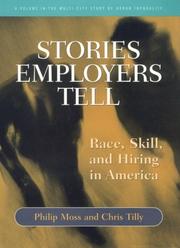Check nearby libraries
Buy this book

"Is the United States justified in seeing itself as a meritocracy, where stark inequalities in pay and employment reflect differences in skills, education, and effort? Or does racial discrimination still permeate the labor market, resulting in the systematic underhiring and underpaying of racial minorities, regardless of merit?
Throughout the 1980s and early 1990s African Americans have lost ground to whites in the labor market, but this widening racial inequality is most often attributed to economic restructuring, not the racial attitudes of employers. It is argued that the educational gap between blacks and whites, through narrowing, carries greater penalties now that we are living in an era of global trade and technological change that favors highly educated workers and displaces the low-skilled.".
"Stories Employers Tell demonstrates that this conventional wisdom is incomplete. Racial discrimination is still a fundamental part of the explanation of labor market disadvantage. Drawing upon a wide-ranging survey of empolyers in Atlanta, Boston, Detroit, and Los Angeles, Philip Moss and Chris Tilly investigate the types of jobs employers offer, the skills required, and the recruitment, screening, and hiring procedures used to fill them.
The authors then follow up in greater depth on selected employers to explore the attitudes, motivations, and rationale underlying their hiring decisions, as well as decisions about where to locate a business."--BOOK JACKET.
Check nearby libraries
Buy this book

Previews available in: English
Subjects
Travail, Arbeitsmarkt, Plan de carrière, Social aspects, Discrimination dans l'emploi, Aspect social, Minorités, Rassendiskriminierung, Discrimination in employment, Minorities, Employment, Career development, Minorities, employment, united states, Discrimination in employment, united statesPlaces
United States, États-Unis, USAShowing 2 featured editions. View all 2 editions?
| Edition | Availability |
|---|---|
|
1
Stories Employers Tell: Race, Skill, and Hiring in America
2001, Russell Sage Foundation
in English
1610444108 9781610444101
|
zzzz
Libraries near you:
WorldCat
|
|
2
Stories Employers Tell: Race, Skill, and Hiring in America (Multi City Study of Urban Inequality.)
February 2001, Russell Sage Foundation Publications, Russell Sage Foundation
Hardcover
in English
0871546094 9780871546098
|
aaaa
Libraries near you:
WorldCat
|
Book Details
Classifications
The Physical Object
ID Numbers
Work Description
"Is the United States justified in seeing itself as a meritocracy, where stark inequalities in pay and employment reflect differences in skills, education, and effort? Or does racial discrimination still permeate the labor market, resulting in the systematic underhiring and underpaying of racial minorities, regardless of merit? Throughout the 1980s and early 1990s African Americans have lost ground to whites in the labor market, but this widening racial inequality is most often attributed to economic restructuring, not the racial attitudes of employers.
It is argued that the educational gap between blacks and whites, through narrowing, carries greater penalties now that we are living in an era of global trade and technological change that favors highly educated workers and displaces the low-skilled."
"Stories Employers Tell demonstrates that this conventional wisdom is incomplete. Racial discrimination is still a fundamental part of the explanation of labor market disadvantage. Drawing upon a wide-ranging survey of empolyers in Atlanta, Boston, Detroit, and Los Angeles, Philip Moss and Chris Tilly investigate the types of jobs employers offer, the skills required, and the recruitment, screening, and hiring procedures used to fill them. The authors then follow up in greater depth on selected employers to explore the attitudes, motivations, and rationale underlying their hiring decisions, as well as decisions about where to locate a business."--Jacket.
Community Reviews (0)
Feedback?| February 17, 2023 | Edited by ImportBot | import existing book |
| December 13, 2019 | Created by MARC Bot | import existing book |









